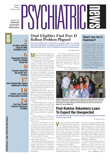Patients with serious mental illness in one state hospital sample had“ alarmingly” high rates of positive tuberculin tests, as well as hepatitis B, C, and HIV serology tests, prompting researchers to call for screening and vaccinating inpatients with serious mental illness.
To gather their data, researchers systematically reviewed data for the 655 patients who were admitted to the Erich Lindemann Mental Health Center in Boston between January 1, 1997, and December 31, 1999.
That state psychiatric hospital admits patients who are referred through the court system for forensic evaluations or are transferred from acute-care hospitals.
Upon admission, patients meet with an infection-control nurse who discusses risk factors for infectious diseases, coordinates disease testing, delivers the results, and counsels patients who test positive for certain infections, according to a report of the study in the December 2005 Psychiatric Services.
A minority of those admitted over the three-year period were deemed too psychiatrically impaired to be screened for infectious diseases or left the hospital before they could be screened.
Researchers measured the frequency of positive tests for 535 patients who received tuberculin tests, 62 who received HIV tests, and 548 who were tested for hepatitis A, B, and C.
When compared with the general population, patients in the sample had four times as many positive tuberculin tests (20.2 percent of those tested screened positive).
In addition, 33.2 percent of patients tested positive for hepatitis A, 24 percent screened positive for hepatitis B, and 21.5 percent screened positive for hepatitis C.
“The number of positive tests for hepatitis B and C among patients screened were five and 12 times as great as population estimates, respectively,” the authors wrote.
Patients in the hospital sample had nine times the number of positive HIV tests as those in the general population (almost 30 percent of those who were screened tested positive).
The authors noted that a limitation of the study was that patients were screened for markers and antibodies of the diseases rather than “active or acute disease; some patients may have had illnesses in the past or even immunization, which may result in positive tests.” Patients who screened positive for infectious diseases were referred to an internal medicine specialist who examined patients further to determine whether they were actually experiencing symptoms of the disease and treated them accordingly.
However, the positive test results found during the study period prompted hospital administrators to take action; due to the high number of positive hepatitis C tests, the mental health center implemented routine screening for hepatitis C antibodies among all patients admitted since 2000. According to the report, patients who screened positive for tuberculin skin tests were more likely to be older or homeless. They were also more likely to be immigrants.
Patients with positive hepatitis B tests tended to be immigrants or have a history of drug use.
Given the relatively high proportion of positive tests for infectious diseases in the state hospital sample, primary investigator William Pirl, M.D., emphasized that for some patients with serious mental illness, psychiatric hospitalizations may provide the perfect opportunity for screening and prevention of infectious diseases.
Pirl is an attending psychiatrist on the Psychiatric Oncology Service at Massachusetts General Hospital and an instructor in psychiatry at Harvard Medical School.
He also pointed out that for patients who are homeless or have chaotic lives, “psychiatric care may be their default primary medical care.”
While hepatitis B and C vaccinations require several injections spaced weeks or months apart, Pirl suggested that inpatients receive their first vaccine during their hospitalization and arrange “outpatient medical care to complete the vaccinations.”
Psychiatr Serv 2005 56 1614
